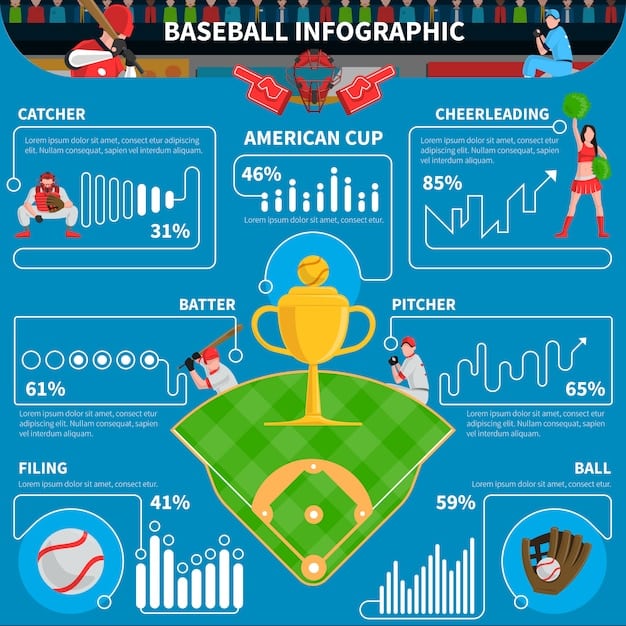League of Legends Esports: Unveiling Player Salary Transparency & Unionization in the US

League of Legends esports in the US faces increasing calls for player salary transparency and unionization to address concerns about fair compensation, working conditions, and long-term career security within the competitive gaming scene.
The competitive world of League of Legends (LoL) esports is a high-stakes arena. As viewership and revenue soar, a crucial conversation is emerging: League of Legends Esports: Player Salary Transparency and Unionization Efforts in the US. This article dives deep into the movement for transparency and unionization, exploring its potential to reshape the landscape for pro gamers in the United States.
The Growing Demand for Transparency in LoL Esports Player Salaries
In the burgeoning world of professional League of Legends, the spotlight shines brightly on star players and their teams. However, beneath the surface of lucrative sponsorships and grand prize pools lies a growing call for transparency, particularly concerning esports player salaries. This demand is fueled by a desire to ensure fairness, stability, and professional standards within the rapidly evolving esports ecosystem.
Why Transparency Matters
Transparency in player salaries can have a profound impact on the esports industry, promoting equity and accountability. Currently, salary information is often shrouded in secrecy, making it difficult for players to assess their market value and negotiate fair contracts. This lack of transparency can lead to exploitation and unequal compensation, particularly for younger or less experienced players.
Increased transparency would empower players with the knowledge they need to make informed decisions about their careers. By knowing the average salary ranges for players in similar roles and skill levels, they can negotiate more effectively and secure contracts that reflect their true worth. This could also help prevent teams from taking advantage of players who may not be fully aware of their market value.

- Fairer Negotiations: Players gain leverage by understanding market standards.
- Attracting Talent: Openness can make esports more appealing to prospective professionals.
- Professionalization: Salary transparency contributes to a more mature and professional industry.
The push for transparency is not without its challenges. Some teams and organizations may resist disclosing salary information, citing competitive advantages and privacy concerns. However, advocates argue that the benefits of transparency outweigh these concerns, as it ultimately fosters a more sustainable and equitable environment for all stakeholders.
The Push for Unionization Among LoL Esports Players in the US
Parallel to the movement for salary transparency is the growing discussion around unionization among League of Legends esports players in the United States. This push for collective bargaining power stems from a desire to address various concerns related to working conditions, player rights, and long-term career security.
Addressing Key Concerns Through Unionization
A union could offer a platform for players to collectively negotiate better terms and conditions with team owners and organizations. Key areas of focus would likely include minimum salary standards, health insurance, retirement plans, and protections against unfair contract termination. These are benefits and securities often taken for granted in traditional sports but are frequently lacking in esports.
Furthermore, a union could advocate for improved working conditions, such as standardized practice schedules, reasonable travel arrangements, and access to mental health support. The demanding nature of professional gaming can take a toll on players’ physical and mental well-being, making it crucial to ensure they have access to the resources they need to thrive.
Potential Challenges and Benefits of a Players’ Union
While the potential benefits of a players’ union are significant, there are also challenges to consider. Organizing and establishing a union in a relatively nascent industry like esports can be complex and require overcoming various legal and logistical hurdles. Moreover, not all players may be in favor of unionization, leading to potential divisions within the community.
- Negotiating Power: A united front strengthens players’ bargaining position.
- Improved Conditions: Unions can advocate for better treatment and support.
- Long-Term Security: Securing benefits ensures players’ future well-being.
Despite these challenges, many players and industry observers believe that unionization is a necessary step towards professionalizing esports and ensuring that players are fairly compensated and protected. A successful union could serve as a model for other esports titles and regions, setting a new standard for player rights and working conditions across the industry.

The Legal Landscape and Esports Player Rights
Understanding the legal framework surrounding esports player rights is crucial in evaluating the potential for salary transparency and unionization efforts. The esports industry is a complex one, operating across various jurisdictions and often lacking clear regulatory oversight. This can create challenges for players seeking to assert their rights and protect their interests.
Contract Law and Player Agreements
Most esports players operate under contracts with their teams or organizations. These contracts typically outline the terms of their employment, including salary, performance expectations, and intellectual property rights. However, contract terms can vary widely, and some players may not fully understand their rights or obligations under these agreements.
It is essential for players to seek legal counsel and carefully review their contracts before signing them. A lawyer specializing in esports law can help players understand their rights, negotiate favorable terms, and ensure that their interests are protected. Without proper legal representation, players may be vulnerable to exploitation or unfair treatment.
Intellectual Property and Revenue Sharing
Another important legal consideration is intellectual property (IP) rights. Esports players often contribute to the creation of content, such as streaming broadcasts, sponsorships, and merchandise. It is crucial for players to understand their IP rights and ensure that they are fairly compensated for their contributions.
- Contract Review: Legal experts can clarify player rights and obligations.
- IP Protection: Players should understand and protect their intellectual property.
- Advocacy Groups: Organizations exist to support player rights and fair treatment.
Transparency in revenue sharing is also essential for ensuring fair compensation. Players should have a clear understanding of how revenue generated from their activities is distributed, and they should be entitled to a fair share of the profits. This is particularly important in cases where players contribute significantly to the brand value of their teams or organizations.
Navigating the legal landscape of esports can be daunting, but it is crucial for players to understand their rights and seek legal counsel when necessary. By doing so, they can protect their interests and ensure that they are treated fairly within the industry.
The Role of Game Developers and Publishers
Game developers and publishers play a significant role in shaping the esports landscape and influencing player salary transparency and unionization efforts. As the creators and owners of the games that esports competitions are based on, developers have considerable leverage over the industry.
Supporting Player Welfare and Fair Compensation
Developers can use their influence to promote player welfare and fair compensation by setting standards for esports leagues and tournaments. They can require participating teams and organizations to adhere to certain minimum salary standards, provide health insurance and retirement benefits, and ensure reasonable working conditions for players.
Furthermore, developers can encourage transparency by requiring teams to disclose player salary information as a condition of participating in their official esports circuits. This would create a level playing field and empower players with the knowledge they need to negotiate fair contracts. It’s important to note this would require complete cooperation between game developers, tournament organizers, and competing teams.
Creating Sustainable Esports Ecosystems
Developers have a vested interest in creating sustainable esports ecosystems that support the long-term growth and stability of the industry. By prioritizing player welfare, fair compensation, and transparency, they can foster a more professional and equitable environment that attracts and retains top talent.
- Setting Standards: Developers can enforce minimum requirements for player compensation.
- Promoting Transparency: Mandating salary disclosure fosters fairness and equity.
- Fostering Sustainability: Developer support contributes to a healthy esports environment.
Ultimately, game developers and publishers have the power to be catalysts for positive change in the esports industry. By embracing their responsibility to support player welfare and promote fair practices, they can help create a more sustainable and rewarding environment for all stakeholders.
The Impact of Media Coverage and Public Perception
Media coverage and public perception significantly influence the discussion around salary transparency and unionization in League of Legends esports. The way the media portrays these issues can shape public opinion and put pressure on teams, organizations, and developers to take action.
Raising Awareness and Driving Change
Investigative journalism and media reports can expose instances of player exploitation, unfair contracts, and inadequate working conditions. By shining a light on these issues, the media can raise awareness among fans, sponsors, and other stakeholders, creating momentum for change.
Positive media coverage of players advocating for their rights and forming unions can also help legitimize these efforts and encourage others to get involved. By highlighting the benefits of transparency, fair compensation, and collective bargaining, the media can help shift public perception and build support for these initiatives.
Navigating Misinformation and Bias
However, it is important to acknowledge that media coverage can also be subject to misinformation and bias. Some media outlets may be more sympathetic to the interests of team owners and organizations, while others may be more critical of the esports industry as a whole.
- Public awareness: Media coverage highlights player challenges and needs.
- Shaping perception: Positive reporting can legitimize unionization efforts.
- Media literacy: Critically assessing news sources ensures informed opinions.
For this reason, it is crucial to critically assess news sources and be aware of potential biases. Seek out a variety of perspectives and rely on reputable sources that have a track record of accurate and unbiased reporting. Only through informed engagement can the public play a constructive role in shaping the future of esports.
Looking Ahead: The Future of Player Rights in LoL Esports
The movement for player salary transparency and unionization in League of Legends esports is still in its early stages, but it has the potential to fundamentally reshape the industry. As esports continues to grow in popularity and revenue, the pressure on teams, organizations, and developers to address player rights will only intensify.
Potential Scenarios and Outcomes
Several potential scenarios could unfold in the coming years. One possibility is that the industry will voluntarily adopt greater transparency and improve player working conditions without the need for unionization. Some teams and organizations may recognize that treating players fairly is in their long-term best interest and take proactive steps to address their concerns.
Another scenario is that the players will successfully form a union and negotiate collective bargaining agreements with team owners. This could lead to significant improvements in player salaries, benefits, and working conditions, but it could also create tensions between players and management.
Ultimately, the future of player rights in LoL esports will depend on the collective actions of players, teams, organizations, developers, and the media. By working together to create a more transparent, equitable, and sustainable ecosystem, the industry can ensure that players are fairly compensated and protected, and that esports continues to thrive for years to come.
- Collaborative Solutions: Cooperation among stakeholders can lead to positive change.
- Player Empowerment: Players must actively advocate for their rights and interests.
- Industry Evolution: Esports must adapt to ensure fairness and sustainability.
Conclusion
The push for League of Legends Esports: Player Salary Transparency and Unionization Efforts in the US marks a pivotal moment. As the industry matures, prioritizing player welfare will be vital for its sustainable growth. Whether through voluntary changes or collective bargaining, a future where esports athletes are fairly compensated, supported, and protected is within reach, setting a new standard for player rights in the digital arena.
| Key Point | Brief Description |
|---|---|
| 💰 Salary Transparency | Players advocate for open salary information to negotiate fair contracts. |
| 🤝 Unionization Efforts | Players seek union representation for improved working conditions and benefits. |
| ⚖️ Legal Landscape | Understanding contracts and IP rights is vital for player protection. |
| 🎮 Developer Role | Game developers can enforce fair compensation standards and transparency. |
Frequently Asked Questions
▼
Salary transparency allows players to understand their market value, leading to fairer contract negotiations and preventing exploitation by teams.
▼
Unionization aims to secure better working conditions, fair salaries, health benefits, and long-term career security for esports players.
▼
Game developers can set standards for esports leagues, ensuring fair compensation, player welfare, and transparency within the industry.
▼
Esports players often encounter contract ambiguities and intellectual property issues, making legal counsel crucial for understanding their rights and obligations.
▼
Media coverage raises awareness, shapes public perception, and can drive change by exposing exploitation and highlighting advocacy for player rights.
Conclusion
In conclusion, the ongoing discussions and efforts towards player salary transparency and unionization in League of Legends esports signify a crucial step towards professionalizing the industry. As esports continues to evolve, addressing these issues will be essential for ensuring a fair, equitable, and sustainable future for all players involved.





